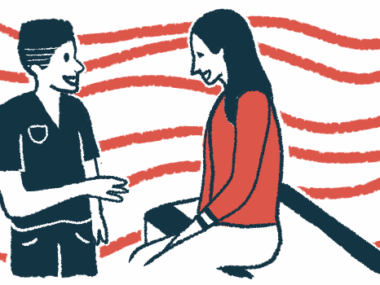The daily fatigue I experience due to aHUS is often unbearable
Chronic fatigue is common with aHUS, particularly for those who need dialysis
Written by |

My eyes sting and my vision is blurry. I rub my right eye and notice black and brown makeup smeared across the back of my hand. Crap. I forgot to wash off my makeup.
My throat is dry and the room is dark. There’s no sunlight coming from the window. I feel a twinge of pain in my chest and remember that it was the chest pain that woke me up. I sit up to take my nightly dose of blood-pressure medication and feel a rush of blood leaving my head, which immediately makes me dizzy.
What time is it? What day is it? How long was I asleep?
Sitting on the side of the bed, I listen to my surroundings. I don’t hear my children playing video games, so they must be asleep. But my ears perk up at the faint sound of the TV in the living room. My husband is watching another Bigfoot documentary. It’s after 1 a.m.
Fatigue, constant sleepiness, and the loss of a sense of time are things I deal with daily. Some days are better then others, but no matter how much sleep I get, I’m always exhausted. Life feels like I’m walking on a tightrope and I’m struggling to maintain my balance. I’ll be awake and functioning yet teetering back and forth as I try not to fall off the tightrope.
A drastic change
Life wasn’t always like this. I used to be an active single mom raising two wild, young boys on my own. I worked as an assistant director at a preschool and had a busy dating life. I was remodeling my first home by myself. I’d wake up at 4:30 a.m. to get everyone ready and out the door, then I’d work for nine hours, return home, and have a great time with my kids. I’d work on my house late into the night.
But that all changed when I nearly died in September 2020. I spent nearly two months in the intensive care unit due to a rare disease called atypical hemolytic uremic syndrome (aHUS). Within hours I went from thinking I merely had a bout of COVID-19 to being told I was being admitted to the hospital with kidney and liver failure and in need of emergency surgery. I soon found myself signing blood transfusion waivers and making end-of-life decisions. There was a very real possibility that I was saying goodbye to my children forever.
I’ve come a long way since that tumultuous time. Living a “new normal” is what my family must deal with now. I’m finally receiving Social Security Disability Insurance, which has been a huge relief. But I still suffer from hemolytic anemia, stage 4 kidney disease, uncontrolled hypertension, and May-Thurner syndrome. I receive regular treatment with Soliris (eculizumab) infusions, which brings me back to the topic of fatigue.
Hemolytic anemia causes the rapid destruction of red blood cells. The body’s tissues can’t get enough oxygen, which in turn impairs the functioning of organs. This is a major cause of fatigue.
According to a 2020 aHUS News article, an assessment of fatigue that used data from the Global aHUS Registry found that aHUS patients had a much lower fatigue score (meaning more fatigue) than the general population.
The fatigue score was even lower for patients on dialysis. (Approximately 70% of aHUS patients eventually need dialysis.) While patients who had been treated with Soliris had higher fatigue scores (meaning less fatigue), my personal experience has been different; Soliris is hard on my body and appears to increase my fatigue.
I sleep harder now than I used to, and when I wake up, I don’t remember having stirred during the night, which I used to remember in the past. I also constantly need to take a two-hour nap during the day, and sometimes two. When I wake up to use the restroom in the middle of the night or after naps, I experience dissociation. I sleep so often that I find myself needing to ask, “Am I awake or dreaming?” Excessive sleep can be very disorienting.
Even after hours of sleep I’m still tired. I wander through life in a constant state of drowsiness. My eyes flutter shut multiple times a day. My kids have even asked, “Mom, why are your eyes doing that?” If I have a busy day or do anything physical, I’ll be stuck in bed for a day or two afterward.
Fatigue seems like it will be a permanent part of my life. I’ve tried various things to alleviate the issue, including taking vitamins D and B12 and probiotics, changing my sleep patterns, changing my diet, exercising, losing weight, and increasing my fluid intake. Some of it has helped, but I still feel like it’s a balancing act.
Do you also have an ongoing problem with fatigue? Please share in the comments below.
Note: aHUS News is strictly a news and information website about the disease. It does not provide medical advice, diagnosis, or treatment. This content is not intended to be a substitute for professional medical advice, diagnosis, or treatment. Always seek the advice of your physician or other qualified health provider with any questions you may have regarding a medical condition. Never disregard professional medical advice or delay in seeking it because of something you have read on this website. The opinions expressed in this column are not those of aHUS News or its parent company, Bionews, and are intended to spark discussion about issues pertaining to aHUS.







Leave a comment
Fill in the required fields to post. Your email address will not be published.